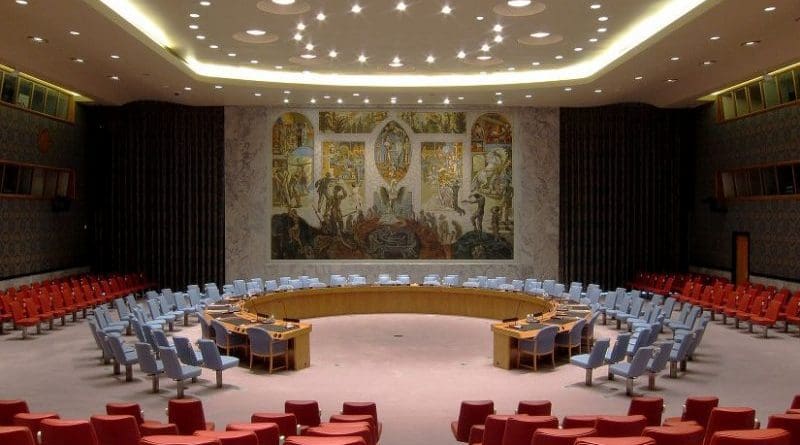A Bridge Too Far: US Fails At UN On Iran – OpEd
The US government is seeking to turn the United Nations into an instrument of its “maximum pressure strategy” vis-a-vis the Islamic Republic of Iran by introducing a draft security council resolution that, among other things, calls for comprehensive sanctions and a permanent arms embargo against Iran. But, so far this has been a lackluster effort that has failed to impress any of the other (permanent and non-permanent) members of the Security Council and will likely fizzle out and be destined to history’s dustbin in the proximate future.
The principal problem with this latest anti-Iran US initiative is that it seeks to prevent the implementation of a UNSC resolution (2231), which calls for the lifting of conventional arms embargo on Iran in October, 2020, in line with the terms of Iran nuclear accord, known as the Joint Comprehensive Plan of Action (JCPOA). But, having violated this resolution by unilaterally exiting the JCPOA, the US government has elicited the negative feedback of both China and Russia, which have submitted letters of opposition to the US initiative by recalling that US is no longer a participant to the JCPOA and has the intention of ‘having its cake and eat it’ by virtue of seeking to derive the benefits of an agreement that it has renounced.
Such contradictory moves by a US administration would raise serious eyebrows in the international community, had it not been seen repeated ad infinitum during the past 3 year and a half with an administration that has excelled in the art of chaos and undermining international norms and principles. Should the US succeed in extending the arms embargo one way or another, and to impose the “snapback sanctions,” then as threatened by Iran’s President Hassan Rouhani Iran will likely respond by exiting the nuclear non-proliferation treaty (NPT) and end its extensive cooperation with the IAEA. As far as Iran is concerned, the real purpose of US’ latest actions against Iran is to put the final nails in the coffin of JCPOA, in order to make it next to impossible for the next administration to revive it. The Republican lawmakers are also busy backing the administration by introducing new sanctions resolutions aimed at frustrating any future thaw with Iran.
An important question here is regarding the European governments, who continue to (at least formally) abide by the JCPOA and, yet, are slowly but surely accommodating the new anti-Iran risings, particularly at the IAEA, in light of their recent support for a non-binding IAEA resolution critical of Iran. A clue to Europe’s quandary however, their bandwagoning with the US at UNSC on Iran could easily put them in material breach of both the JCPOA and UNSC 2231, thus contributing to the demise of JCPOA, deemed important for European security.
A delicate balancing act by Europe is therefore needed, which is sadly lacking today, despite the verbal self-distancing of foreign ministers of France, England, and Germany from the US in their recent joint statement, which once again expresses regret at US’s unilateral exit from the JCPOA. A more assertive European approach is needed, one that can stand up more forcefully to Uncle Sam and its numerous transgressive behavior under the Trump administration.
In turn, the US’ failure at UNSC, or at the least the lack of progress, raises the question of what is the right US strategy toward Iran? According to a recent report by the Atlantic Council, the Trump administration has no real (and working) Iran strategy and should veer in the direction of diplomacy with Iran. This however overlooks the role of third parties, such as Israel and Saudi Arabia, that exert a great deal of influence on the White House and are opposed to any softening of the maximum pressure strategy.
In addition, there is the issue of Trump’s Iranophobic advisors who counsel him against a modus vivendi with Iran and who have so far managed to frustrate some feeble attempts by Trump to de-escalate tensions with Iran, as evidenced by the new book published by John Bolton, a former national security advisor-turned critic of President Trump, who claims that his threat of resigning on several occasions prevented Trump from meeting Iran’s foreign minister. Bolton also writes about enlisting Israel’s Primer Minister to pressure Trump away from a thaw with Iran, which incidentally contradicts Bolton’s claim that the role of national security advisor is to support president’s policies. Bolton misrepresents the JCPOA as “unenforceable, unverifiable,” which is pure rubbish, given the IAEA’s unique access to Iran’s nuclear facilities, and he also fails to mention that his promise to Trump of creating an international coalition to back his JCPOA exit never materialized and proved to be an empty promise.
Henceforth, after a rude awakening at the Security Council, the Trump administration maybe primed for a serious reconsideration of its doomed-to-fail harsh Iran policy that has simply had negative repercussions for both US and Iranian national interests. The time to correct these mistakes by Trump is running out and, as a result, we are apt to witness more of the same, unreconstructed enmity toward Iran, for the remainder of Trump’s presidency.

